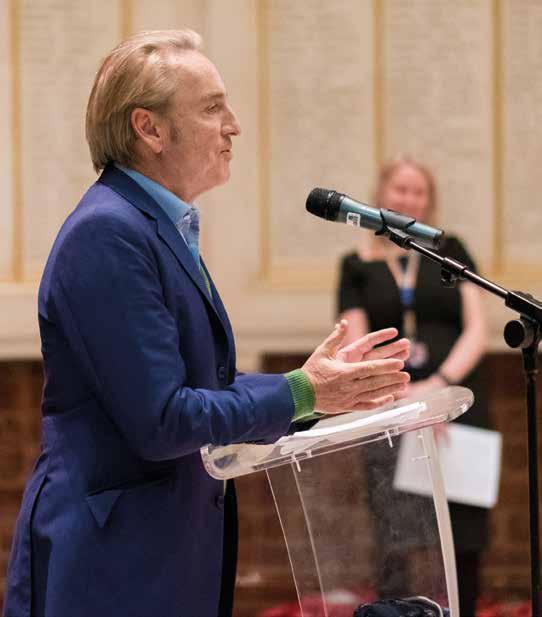
3 minute read
Far East Prisoners of War (FEPOW
LSTM’s involvement with ex-Far East prisoners of war and their descendants is the longest collaboration in its history. On 24 October 2019 LSTM’s much-anticipated ‘Secret Art of Survival’ exhibition was officially opened by art historian Philip Mould at Liverpool’s Victoria Gallery & Museum (VG&M).
Organised in partnership with VG&M, it was funded by a grant from the Lottery Heritage Fund, Trusts and private donors and was due to run until 20 June 2020. The culmination of a seven-year research investigation and four years in the planning, the ‘Secret Art of Survival’ Art dealer and broadcaster showcased previously Philip Mould OBE opens the exhibition unseen artwork created secretly during captivity by 40 of the 69 British servicemen uncovered by the LSTM investigation. All had been Far East prisoners of war (FEPOW) held in camps throughout southeast Asia and the Far East.
Advertisement

In early December, Captive Artists, the unseen art of British Far East prisoners of war, was published by Palatine Books. Co-authored by LSTM’s Meg Parkes and Geoff Gill, it is the third volume in a series based on their FEPOW research studies, for which they collaborated with Jenny Wood, former senior art curator at the Imperial War Museum. Captive Artists documents all 69 artists revealed by the investigation; during the exhibition another three artists were discovered, bringing the total to date to 72. In late February 2020, Philip Mould hosted a mini exhibition and book signing at his Pall Mall gallery in London. An associated ‘FEPOW Education Project’ that began 2018 and ran throughout the exhibition, involved Merseyside and Cheshire schools as well as the public. Due to the pandemic the exhibition was forced to close after just four months. By then over 12,000 visitors had seen the exhibition.
One of the legacies of the exhibition was the re-development of LSTM’s Captive Memories website – re-launched to mark the 75th anniversary of Victory over Japan (VJ) day on 15 August 2020. It features a virtual tour of the galleries, downloadable Resource Packs for educators and FEPOW families, information about the books and more artwork.
Another casualty of the pandemic was the seventh international Researching FEPOW History conference due to take place at LSTM in June. Co-hosted by LSTM and the Researching FEPOW History Group, this has been postponed until June 2022. VJ Day 75
In the lead up to VJ Day, Meg Parkes worked with the BBC supplying FEPOW artwork for use in their national commemoration programmes. Meg Parkes and Geoff Gill were also asked to advise on, and supply archive material for, a VJ Day75 Service of Remembrance and Thanksgiving at Liverpool Parish Church (Our Lady and St Nicholas). Due to the COVID-19 pandemic the service had to be held virtually. Meg Parkes gave an interview for BBC Radio Newcastle and Geoff Gill took part in an online discussion about the Burma Railway, organised by the National Army Museum. He was joined by the author and historian Julie Summers, granddaughter of Territorial Army officer Colonel Philip Toosey, a former FEPOW. A Liverpool businessman, Philip Toosey later became the first President of LSTM.
Medical History Research
Meg Parkes and Geoff Gill are linking with Imperial College London concerning an enquiry into anaesthetic practice on the Thai-Burma Railway as well as with Professor Dennis Shanks in Australia, who is investigating factors affecting malaria and cholera mortality amongst FEPOWs. Geoff Gill is currently co-supervising a PhD student at the Department of History in the University of Liverpool who is investigating sea transport of FEPOWs by the Japanese.
Commemorating FEPOW Repatriation
To mark the 75th anniversary of the FEPOW repatriation to Britain, through Liverpool and Southampton during the autumn of 1945, Meg Parkes has been consulting with the ‘FEPOW75’ team on the development of a new website to highlight the occasion. This autumn also marks the 75th anniversary of the start of LSTM’s involvement with FEPOW, when the first men presented for medical help – many with relapses of malaria and amoebic dysentery. Later clinical and research work was to uncover other health problems related to captivity – notably chronic Strongyloides worm infections, neurological disorders related to B vitamin deficiencies, and in over one-third, post-traumatic stress disorder (PTSD). This research is documented on the Captive Memories website.










